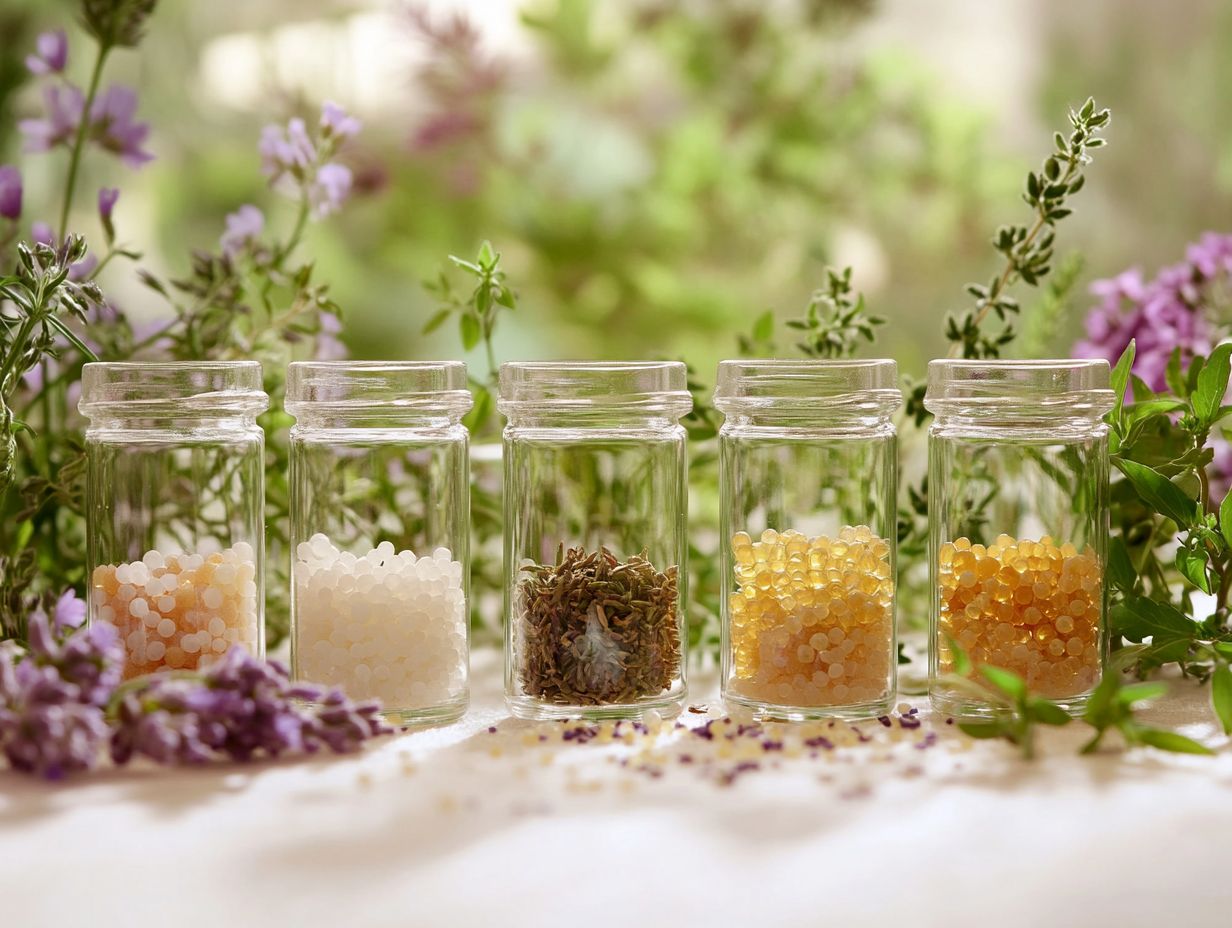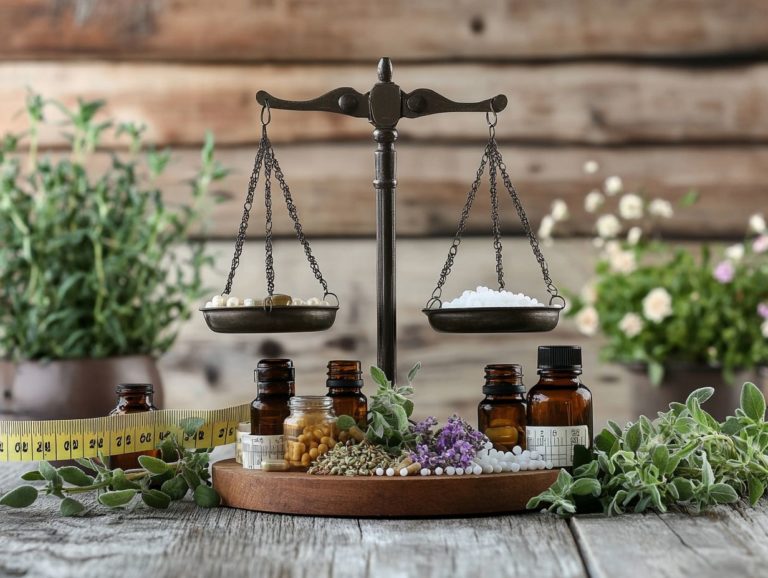5 Most Popular Homeopathic Remedies Explored
Homeopathy presents a distinctive approach to healing, focusing on the body’s inherent capacity to restore itself.
In this article, you will delve into five of the most esteemed homeopathic remedies Arnica Montana, Nux Vomica, Aconite, Belladonna, and Calendula each highlighted for its specific uses and benefits.
You will also explore the fundamental principles of homeopathy, learn how these remedies are carefully made, and discover the various forms they take.
Uncover how homeopathy can effectively address specific health concerns, understand potential side effects, and gather insightful tips for seamlessly integrating it into your daily routine.
These remedies could very well be the gentle solution you’ve been seeking.
Contents
Key Takeaways:

Arnica Montana is a popular homeopathic remedy for bruises, sprains, and muscle soreness. It is known for its anti-inflammatory and pain-relieving properties.
Nux Vomica is commonly used to treat digestive issues, such as indigestion and constipation. It may also help with stress, insomnia, and headaches.
Aconite is often used for acute conditions, such as coughs, colds, and fevers. It is believed to have anti-inflammatory, antiviral, and calming effects.
1. Arnica Montana
Arnica Montana is a popular homeopathic remedy known for treating bruises, muscle pain, and strains. It is commonly found in first aid kits across Europe and the United States.
You might also find it helpful for post-surgical recovery and chronic pain management, showcasing its impressive versatility.
Homeopathy practitioners often suggest applying this remedy in gel or cream form directly to the skin for quick relief from swelling and discomfort.
While some scientific studies hint at positive results especially in reducing soreness after exercise the evidence on its overall effectiveness remains somewhat mixed.
Experts advise exercising caution when using Arnica, as it can lead to skin irritation or allergic reactions in sensitive individuals. Therefore, when considering this remedy, it s wise to consult with a healthcare professional for tailored advice.
2. Nux Vomica
Nux Vomica is a highly regarded homeopathic remedy that you might find helpful for addressing several health concerns, especially those related to digestive issues, stress, and chronic ailments. It occupies a noteworthy place in the world of complementary medicine.
You ll appreciate its potential benefits in managing symptoms of indigestion, irritable bowel syndrome, and even those pesky repercussions of a little too much indulgence, like hangovers.
The preparation process is careful and detailed. It involves diluting seeds from the strychnine tree, which can be harmful in large amounts, followed by vigorous shaking multiple times.
In homeopathy, it s typically administered in pellet form and the diluted doses are considered safe and effective for a variety of patients. While some people are skeptical, many have had success with it!
3. Aconite

Aconite, derived from the monkshood plant, stands out as a prominent homeopathic remedy, particularly effective for treating acute health issues, especially when fear or anxiety rears its head. It provides immune support during those particularly stressful moments.
You ll find that Aconite is often in high demand for its ability to tackle conditions like fever, colds, and even acute panic attacks.
In the realm of homeopathy, this remedy undergoes a meticulous process of serial dilution and succussion, a method believed to amplify its healing properties while minimizing toxicity.
While skepticism lingers within the scientific community regarding its efficacy largely due to a lack of definitive clinical studies many patients share their positive experiences. However, safety should always be at the forefront; potential side effects may include gastrointestinal distress or allergic reactions, underscoring the importance of consulting with a healthcare provider before use.
Thinking about trying homeopathy? Always consult a healthcare provider first to find the right approach for you.
4. Belladonna
Belladonna is a powerful homeopathic remedy. It can help with fever, inflammation, and severe headaches. However, it raises questions about safety and side effects.
This herb is derived from the leaves and berries of the plant. It is known for its pain-relieving effects and its effectiveness in reducing muscle spasms. It works by blocking acetylcholine, a neurotransmitter that is essential for various bodily functions.
Despite these therapeutic advantages, skepticism about Belladonna’s safety is valid. Overconsumption can lead to serious side effects, such as hallucinations, rapid heartbeat, and dry mouth.
Make sure to consult a qualified health professional before trying it!
5. Calendula
Calendula, commonly known as marigold, is a standout in homeopathy. It is celebrated for its impressive health benefits, especially for skin issues and wound healing. This makes it a critical remedy for your first aid kit.
This vibrant flower is your go-to for a variety of conditions, including cuts, burns, insect bites, and inflammatory skin disorders.
The formulation process in homeopathy is fascinating. It involves extracting the plant s active compounds through careful dilution and vigorous shaking. This boosts the remedy’s potency and ensures its safety for use.
Scientific studies show that calendula is effective in reducing inflammation and speeding up healing time. This solidifies its reputation within alternative therapies. As a natural solution, calendula complements holistic health care approaches, treating the whole person rather than just isolated symptoms.
What Is Homeopathy and How Does It Work?

Homeopathy, established by Samuel Hahnemann in the late 18th century, presents an intriguing system of alternative medicine. It uses highly diluted substances to activate your body’s natural healing abilities. This idea continues to spark both enthusiasm and skepticism within the medical community due to its controversial efficacy and ties to the placebo effect.
At its core, homeopathy rests on key principles like the law of similars. This principle suggests that a substance causing symptoms in a healthy individual can, in turn, alleviate similar symptoms in someone who is unwell.
The historical backdrop of homeopathy plays a crucial role in its acceptance, emerging during an era marked by skepticism toward conventional medical practices.
Proponents argue that homeopathy offers a holistic approach and personalized treatment options. Critics, however, highlight the lack of robust scientific evidence supporting its effectiveness and often attribute perceived benefits to the placebo effect.
This clash of perspectives opens a broader discussion about the essence of medicine and how various treatments can coexist in a multifaceted healthcare landscape.
What Are the Key Principles of Homeopathy?
The key principles of homeopathy are anchored in the notion of “like cures like.” This means that substances known to induce symptoms in healthy individuals are used in their diluted forms to remedy similar symptoms in those who are unwell.
Central to this practice are the modalities of dilution and vigorous shaking, which enhance the medicinal properties of these remedies. This foundational concept promotes a holistic approach to healing, emphasizing the body s ability to stimulate its own healing processes through remedies that reflect the symptoms of illness.
Practically, the dilution process involves reducing the concentration of the original substance while incorporating vigorous shaking, which is thought to amplify therapeutic effects.
For practitioners, understanding these principles is essential. They undergo extensive training to identify appropriate remedies and interpret individual patient symptoms within a broader context. This training combines theoretical knowledge with practical skills in observation and analysis, ensuring that practitioners can effectively implement these concepts to facilitate healing in their patients.
How Are Homeopathic Remedies Made?
Homeopathic remedies are carefully made by mixing natural ingredients in water or alcohol and shaking the mixture vigorously. This method enhances the medicinal properties while ensuring patient safety with minimal doses.
This process preserves the original substance’s essence and boosts its effects. Practitioners start by choosing a specific natural ingredient and diluting it in a precise manner to create a series of strengths. Each step requires strict adherence to training standards, ensuring that every remedy is crafted with precision.
The shaking process, known as succussion, involves striking the diluted solution against a firm surface. This further elevates its healing potential and aligns with the core principles of homeopathy, which emphasize individualized treatment and holistic healing.
What Are the Different Forms of Homeopathic Remedies?

Homeopathic remedies come in various forms pellets, liquids, and creams each crafted to address specific health conditions and align with your preferences.
These adaptable options empower you to choose a method of administration that fits seamlessly into your lifestyle. Whether you prefer the convenience of a dissolve-on-the-tongue pellet, the flexibility of a tincture, or the precision of a topical cream, there’s something for everyone.
Typically, these remedies are designed to tackle a wide array of ailments, from minor issues like headaches and colds to more complex chronic conditions. Getting the dosing right is crucial for effective treatment; incorrect amounts can impact effectiveness.
This highlights why personalized consultations are vital they help determine the most effective approach tailored just for you.
How Can Homeopathy Help with Specific Health Conditions?
Homeopathy offers relief for various health issues, from colds to arthritis. Tailored remedies like Aconitum for flu and Rhus tox for joint pain can effectively target your symptoms.
If allergies are your concern, remedies featuring Allium cepa can alleviate bothersome symptoms like runny noses and watery eyes. While many patients report positive outcomes, it’s important to recognize that clinical evidence supporting the effectiveness of homeopathic remedies varies. Some studies yield promising results, while others raise questions about their efficacy.
As you consider homeopathy, carefully weigh your personal experiences against the scientific findings.
What Are the Possible Side Effects of Homeopathy?
Homeopathy is generally considered safe; however, it’s crucial to recognize that potential adverse side effects can arise, especially if remedies aren t administered correctly. This emphasizes the importance of patient safety in the practice of homeopathy.
Some practitioners may overlook initial symptom worsening, where you might experience a temporary increase in symptoms before improvement occurs. This can lead to unnecessary concern if you’re not fully aware of how the process works.
Without proper guidance, you may select inappropriate remedies or dosages, increasing the risk of unintended reactions. That s why seeking advice from qualified homeopathy practitioners is essential. They can address your concerns and help you navigate the complexities of treatment effectively.
By turning to these professionals, you can receive tailored guidance that ensures a safer experience while maximizing the therapeutic benefits of homeopathic remedies.
C mo incorporar la homeopat a en tu vida diaria?
Incorporar la homeopat a en tu vida diaria significa comprender sus principios y utilizar tratamientos homeop ticos para problemas de salud comunes. Esto forma parte de un enfoque del bienestar a trav s de consultas con practicantes experimentados.
Para comenzar, explora remedios homeop ticos para dolencias cotidianas como dolores de cabeza o resfriados. Estos se pueden tratar a menudo con cuidados personales.
Mantener un botiqu n de primeros auxilios homeop tico a tu disposici n te empodera en situaciones de salud menores. Fomenta un sentido de independencia y preparaci n!
Al combinar la homeopat a con otras formas de medicina complementaria, como los suplementos herbales, puedes crear una estrategia integral para manejar tu salud.
Cuando no est s seguro sobre un remedio o enfrentas una condici n m s seria, buscar orientaci n profesional es esencial. Esto asegura un tratamiento seguro y efectivo adaptado a tus necesidades.
Preguntas Frecuentes
- Cu les son los 5 remedios homeop ticos m s populares? Los 5 m s populares son Arnica montana, Nux vomica, Natrum muriaticum, Ignatia amara y Belladonna.
- Para qu se usa Arnica montana? Arnica montana trata moretones, dolor muscular e inflamaci n.
- C mo ayuda Nux vomica? Nux vomica alivia la hinchaz n, el estre imiento y la acidez estomacal.
- Qu condiciones puede tratar Natrum muriaticum? Ayuda con el duelo, el malestar emocional y problemas de piel como el eczema.
- Para qu se usa Ignatia amara? Este remedio es para el duelo, la ansiedad y los dolores de cabeza.
- C mo funciona Belladonna? Trata fiebre alta y dolor corporal al estimular la curaci n natural.
Explora m s sobre la homeopat a y consulta a un practicante para tu bienestar!






